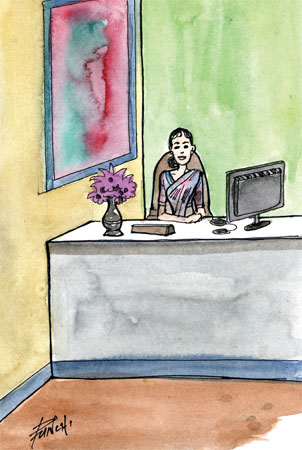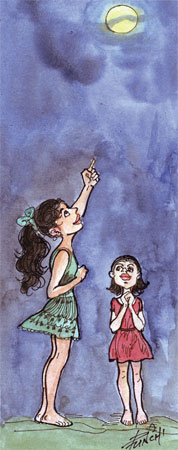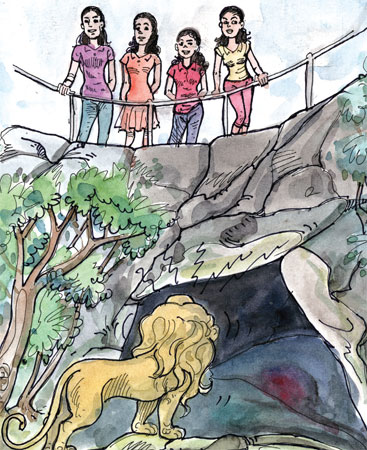|

by R. S. Karunaratne
How to use the definite article
We use the definite article “the” to talk about someone or something,
when the speaker and the listener know about them. In other situations
we use the indefinite articles “a” or “an.”
Could you close the window?
|

The girl at the reception is beautiful. |
(You know which window.)
Mother is going to the post office.
(You know which one.)
Can I use the phone?
(Your phone)
I didn’t like the play.
(The one you saw.)
You can’t look at the sun.
(There is only one sun.)
You can look at the moon.
(There is only one moon.)
The world is getting over-populated.
(There is only one world.)
Father is sitting in the front row.
(You know which row.)
Bala came on the 6.10 train.
(You know which train.)
How much is the piano?
(You know which piano.)
The man you brought here is inefficient.
(You know which man.)
The girl at the reception is beautiful.
(You know which girl.)
We use “the” before “only, first, second, third” and superlatives
such as “richest, most” and “oldest.”
He is the only man who can do this job.
Who is the first man on the moon?
He lives in the second house from here.
Can you see your son in the third row?
I am the fourth child in my family.
He passed the examination in the fifth attempt.
Who is the most intelligent boy in your class?
The oldest member of the XYZ Party died recently.
He is the only doctor I know.
This is the oldest hotel in Colombo.
They live on the 10th floor.
|

You can look at the moon |
We use “a” or “an” to talk about a person or thing for the first
time. We use “the” when we talk about them again.
The policeman arrested a suspect. After some time, the suspect tried
to run away.
This is an elephant. It is the biggest animal on earth.
Although we do not use “a” or “an” with plural nouns, we use “the”
with them.
He is wearing brown shoes. He bought the shoes last week.
[Activity]
Put “a, an” or “the” in the blanks and check your answers with the key.
1. Would you like ........... cup of tea?
2. I’ve got .......... expensive present for you.
3. Mary is ....... most beautiful girl in our class.
4. What time is .......... first train to Kandy?
5. June is ........... hottest month of the year.
6. Where is ............ principal?
7. I rang ......... bell and an old woman opened .......... door.
8. Can I use .......... toilet, please?
9. I need ......... English - Sinhala dictionary.
10. Who’s .......... boss in your office?
Key:
1. a 2. an 3. the 4. the 5. the 6. the 7. the, the 8. the 9. an 10. the
Match words and meanings
Here’s an interesting way to enrich your word power. Match the words
in column “A” with their meanings in column “B” and check your answers
with the key. The first one has been done for you.
[Column A]
Y.. 1. continual
... 2. continuous
... 3. contour
... 4. contraband
... 5. contradict
... 6. contraption
... 7. contrast
... 8. contravene
... 9. controversial
... 10. contusion
... 11. conundrum
... 12. convalesce
... 13. convene
... 14. convent
... 15. conventional
... 16. conversant
... 17. convert
... 18. convex
... 19. convey
... 20. convince
... 21. convinced
... 22. convivial
... 23. convoluted
... 24. convulse
... 25. cool
[Column B]
A. someone who changes their beliefs
B. to be familiar with
C. a building in which nuns live
D. to do something illegal
E. to rest after an illness
F. a problem that is difficult to deal with
G. without a pause or interruption
H. obvious difference between two or more things
I. goods brought into or taken out of a country secretly
J. to state the opposite of what you have said
K. a bruise
L. to express a thought
M. certain
N. slightly cold
O. to shake violently
P. twisted
Q. friendly
R. to persuade someone
S. curved
T. traditional and ordinary
U. to arrange a meeting
V. causing disagreement or discussion
W. a device that looks awkward
X. the shape of a mass of land
Y. happening repeatedly
Key:
2. G 3. X 4. I 5. J 6. W 7. H 8. D 9. V 10. K 11. F 12. E 13. U 14. C
15, T 16. B 17. A 18. S 19. L 20. R 21. M 22. Q 23. P 24. O 25. N
Agreement
There should be agreement between the subject and the verb. A
singular subject takes a singular verb. A plural subject takes a plural
verb.
[Singular]
|

Lions roar when they are angry |
The door is open.
He is upset.
It has been raining since 9 a.m.
The soup tastes good.
The boy is eating a mango.
The cat sits on the mat.
The dog wags its tail.
She drives the car very slowly.
Father is reading a newspaper.
The butcher sells beef.
Nayana teaches English.
[Plural]
The doors are open.
The door and the window are open.
Her skirt is blue.
Crocodiles are reptiles.
The children have got wet.
The apples are sweet.
Some of the roads are carpeted.
Babies are crying.
The dogs chase a rabbit.
Lions roar when they are angry.
After “everybody, everyone, someone, somebody, anybody, anyone,
nobody, no one, nothing, something, every” and “each” we use singular
verbs.
The company paid a bonus and everyone is happy.
Everybody in this class learns English.
Someone is waiting at the gate.
Somebody is following me.
Anybody is free to leave the class.
Nobody is perfect.
No one is above the law.
Nothing is happening here.
Something has gone wrong.
Every seat is numbered.
Each door has a lock.
After “one of ...” we use a singular verb.
One of the boys is ill.
One of the dogs is missing.
One of the teachers is giving private tuition.
One of the women is selling fish.
One of the fishermen is very young.
After “a number of ...” we use a plural verb.
A number of questions were asked.
A number of soldiers were injured.
A number of cattle are stolen.
A number of young men want jobs.
A number of kittens are missing.
After “a lot of ...” the verb should agree with the subject.
A lot of pollution is created by man.
A lot of trees are cut down every day.
A lot of children are playing in the park.
A lot of corruption is reported from the police department.
A lot of Rs 20 notes have been printed.
When a plural noun comes after “any of, either of, neither of” or
“none of” we can use either a singular or a plural verb.
Is any of these books available for sale?
Are any of these books available for sale?
Either of those proposals is acceptable.
Either of those proposals are acceptable.
Neither of these engines works properly.
Neither of these engines work properly.
None of them has come.
None of them have come.
After an amount of money, a distance, a weight or a length of time,
we use a singular verb.
One hundred rupees is a fair price.
A hundred metres is not a long distance.
Fifty kilogrammes is too heavy for me to lift.
Ten minutes is not a long wait.
Quiz on idioms
An idiom is a special kind of phrase. It is a group of words which
have a different meaning when used together from the one it would have
if the meaning of each word were taken individually. Tick the meaning of
the idioms in bold type and check your answers with the key.
1. If someone has kicked the bucket...
(a) They have died
(b) They have won a competition
(c) They have been punished
2. If you nip something in the bud...
(a) you don't stop it at an early stage
(b) you stop it at an early stage
(c) you promote it by remaining silent
3. If a project hits the buffers...
(a) it is accepted by everybody
(b) it becomes popular
(c) it experiences difficulties
4. If you are bitten by the acting bug...
(a) you become very enthusiastic about acting
(b) you become hostile to acting
(c) you get negative feedback for your acting
5. If you describe someone as a bull in a China shop...
(a) They behave well in society
(b) They show signs of vigour and vitality
(c) They do things which offend other people
6. If you take the bull by the horns...
(a) you act decisively in a difficult situation
(b) you act foolishly in a difficult situation
(c) you fail act in a difficult situation
7. If someone bites the bullet...
(a) they die
(b) they accept a difficult situation
(c) they accept defeat
8. If someone is not a happy bunny...
(a) they are playful all the time
(b) they are happy all about something
(c) they are unhappy about something
9. If someone burns their boats...
(a) it is impossible for them to return to an earlier situation
(b) they drown
(c) they lose all their wealth
10. If you don't beat about the bush...
(a) you fail to express yourself
(b) you don't say what you want to say
(c) you say what you want to say clearly
Key:
1. (a) 2. (b) 3. (c) 4. (a) 5. (c) 6. (a) 7. (b) 8. (c) 9. (a) 10. (c) |

